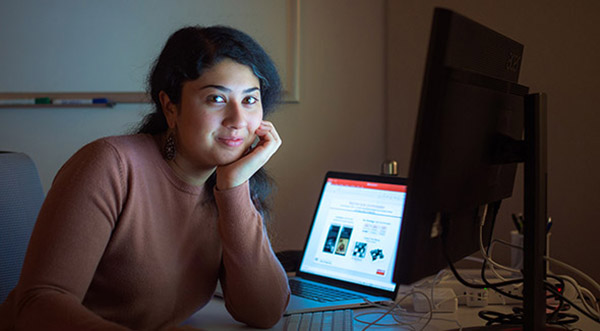COMPUTING AND AI: HUMANISTIC PERSPECTIVES FROM MIT
Women's and Gender Studies
Ruth Perry, with Sally Haslanger and Elizabeth Wood

Smriti Pramanick, CS+HASS Innovation Scholar; MIT Music Technology Lab; Photo: Gretchen Ertl
Action
"The Schwarzman College of Computing presents MIT with a unique opportunity to take a leadership role in addressing some of most pressing challenges that have emerged from the ubiquitous role computing technologies now play in our society — including how these technologies are reinforcing and even exacerbating social inequalities."
Series | Computing and AI: Humanistic Perspectives from MIT
Ruth Perry, the Ann Fetter Friedlaender Professor of the Humanities, is an authority on 18th-century English literature and culture, women’s writing, and feminist theory. The author of numerous books and articles, she is currently writing a biography of 18th-century ballad tradition-bearer Anna Gordon, also known as Mrs. Brown of Falkland. She founded MIT Women’s Studies in 1984 and co-founded the Graduate Consortium in Women’s Studies in 1991. She was elected president of the American Society for Eighteenth-Century Studies in 2000.
Sally Haslanger is the Ford Professor of Philosophy, in the MIT Department of Linguistics and Philosophy. She has written extensively on topics in metaphysics, epistemology, and feminist theory, with a recent emphasis on accounts of the social construction of race and gender. She co-edited Adoption Matters: Philosophical and Feminist Essays (Cornell University Press, 2005) with Charlotte Witt; Theorizing Feminisms (Oxford University Press, 2005) with Elizabeth Hackett; and Persistence (MIT Press, 2006) with Roxanne Marie Kurtz.
Professor Elizabeth Wood of the History Section has written three books, Roots of Russia’s War in Ukraine (co-authored; Woodrow Wilson Center and Columbia University Press, 2016); Performing Justice: Agitation Trials in Early Soviet Russia (Cornell University Press, 2005); and The Baba and the Comrade: Gender and Politics in Revolutionary Russia (Indiana University Press, 1997), as well as numerous scholarly articles on gender and performance.
. . .
Q: What are some examples of domain knowledge, perspectives, and methods from the field of women’s and gender studies that should be integrated into the research and curriculum of the Schwarzman College of Computing and why?
The Schwarzman College of Computing presents MIT with a unique opportunity — indeed, a responsibility — to take a leadership role in addressing some of most pressing challenges that have emerged from the ubiquitous role computing technologies now play in our society, including how these technologies are reinforcing and even exacerbating social inequalities.
For example, while technology is changing the workforce in many ways, the International Monetary Fund has calculated that more of the jobs currently held by women than men risk technologically driven extinction. A recent Institute for Women’s Policy Research group report delves further into the impact of the impending artificial intelligence (AI) revolution on women, who are estimated to make up almost half of the current U.S. workforce.
This report points out that in the financial services industry, women account for about half of the total workforce but hold only about a quarter of senior management positions at a level likely to survive automation. Women are heavily concentrated in the routine clerical and administrative grades that are at much higher risk of being engineered out of existence. More than 80 percent of bank tellers in the United States are female. This kind of imbalance can also be found in other service industries that are being taken over by new forms of automation and machine learning.
Since the early Industrial Revolution, new technology has been used to replace people, as well as complement and support them in their work, so the precedents for human well-being are not entirely encouraging. The jobs of female workers under threat are, in some sectors, relatively highly paid, which can mean both qualitative and quantitative degradation of women’s opportunities. If such jobs disappear, this will further restrict the possibility of upward social and career mobility for women.
Incorporating gender issues throughout the design of the Schwarzman curriculum can help ensure that MIT graduates more computer scientists with an understanding of the gender dimension of both employment problems and problems inherent to AI fields.

L to R: Elizabeth Wood, MIT Professor of History; Ruth Perry, Ann Fetter Friedlaender Professor of the Humanities; Sally Haslanger, Ford Professor of Philosophy at MIT
Action
"Ensure that women’s voices are heard and that coursework and research is designed with a keen awareness of the difference that gender makes. This is the single-most powerful way that the MIT research and teaching community can address the serious inequities that have emerged in the computing fields."
It will also help immensely if the SCC can attract and retain more women in the computing fields. The workforce of the technological industries today continues to show a large gender gap, and the industries tend to support corporate cultures that are poorly attuned to women and their needs. As the sector has expanded in recent decades, the percentage of women computer scientists, systems analysts, software developers, and computer support specialists has not kept pace, and the earnings pay-gap for women and men with similar skill sets has not closed. Women of color have been particularly undervalued in technology fields.
As a result, it appears increasingly likely that women workers and people of color will be trapped at the lower ends of a digitized “gig-economy,” performing roles heavily focused on social support and caring — a development likely to produce a corresponding increase in precarious employment, erratic schedules, and declining labor protections.
As MIT launches the SCC, we must ensure that women’s voices are prominent and that coursework and research are designed with a keen awareness of the difference that gender makes. This is the single most powerful way that the MIT research and teaching community can begin to address the serious inequities that have emerged in the computing fields.
Currently, women are often at a disadvantage owing to their relatively smaller presence in fields focused on science, technology, engineering, and math (STEM). According to the World Economic Forum, women hold more than half of all university degrees but only 36 percent of STEM degrees, and they make up only about a quarter of the STEM workforce. Among AI professionals, only 22 percent are women, and in machine learning they are just 12 percent of leading researchers. Active efforts are needed to reverse this trend, to change the mostly male climate in teaching, learning, and research in computing and to provide role models and mentors for young women.
Society is already facing some of the consequences of male dominance in the fields that will be at the heart of the SCoC. There have been reports that the increasing use of AI algorithms in personnel and recruitment programs — which reflect the gender biases of their creators — have set up new discriminatory hurdles to women’s entry to professions and to higher administrative and executive grades. ProPublica has reported similar issues emerging from the use of algorithms in criminal sentencing, a practice that has led to more severe penalties for black defendants than white ones. Instead of making decision-making processes swifter and more accurate than human judgment, the prejudices of the programmers are simply automated — a development that should be of concern to everyone.

Detail, "Ties that Bind," @2017 Ekua Holmes: emblem of the MIT WGS program
"While technology is changing the workforce in many ways, more of the jobs currently held by women risk technologically driven extinction. For example, in the financial services industry, women account for about half of the total workforce but hold only about a quarter of senior management positions at a level likely to survive automation."
Amazon Created a Hiring Tool Using A.I. It Immediately Started Discriminating Against Women.
Most feminist works on computer culture agree that algorithms tend to perpetuate the biases of the culture from which they emerge. Female voices, answering to female names (Siri, Alexa), do one’s bidding as digital assistants on one’s smart phone — reinforcing social stereotypes that women are there to serve — and are happy to do so endlessly and without thanks or recognition. Insulting or sexually explicit remarks to these “female” digital assistants are taken in the same spirit of docile acceptance. It’s like a game set up to indoctrinate a whole culture about women’s patience, obedience, and lack of self.
Gender bias turns up in AI wherever the tools being created are constructed by a single social group — such as white men — with a single kind of life history and upbringing or socialization. Such limitations in who creates AI tools naturally produce a limited mindset about whatever problems programmers hope to address. Automated decision-making about hiring for high-paying jobs, translating languages, and setting criminal penalties are just a few examples of algorithms that have displayed gender and race biases in practice. One cannot simply copy the way things are done at present into AI formulas and expect them to be neutral in respect to gender or race; our world is too lopsided for that.
That’s why the humanist and social science components of the SCC are critical and why it’s so important to incorporate the thinking from the field of women's and gender studies into the college. The workforce constructing AI must be more thoroughly diversified than either the academy or the government is today if the processes that AI controls are to be an advance over the unequal society in which we live currently. And researchers must be trained in feminist and anti-racist theory and methods in order to avoid simply reproducing the injustices entrenched in our society.
Suggested links
Series | Computing and AI: Humanistic Perspectives from MIT
MIT Women and Gender Studies Program
Sally Haslanger | MIT Philosophy
MIT Schwarzman College of Computing
Related publications
Profile of Ruth Perry, MIT Literature
"Women and Computers: An Introduction,"
by Ruth Perry and Lisa Greber, in Signs, Vol. 16, No.1, From Hard Drive to Software: Gender, Computers, and Difference, (Autumn, 1990, pp. 74-101; University of Chicago Press
Sally Haslanger: On Gender Bias, Election Insights Series
Women in Philosophy: Haslanger commentary in The New York Times
Q&A with MIT Philosopher Sally Haslanger: What is "natural" and what is "social"?
Elizabeth Wood: On the Putinization of Politics, Election Insights Series
Susan Silbey: Wjhy do women leave engineering?
Study co-authored by MIT anthropologist Susan Silbey shows that group dynamics of teamwork and internships deter many women in the profession.
Women, Technology, and the Future of Work
IMF Blog; Era Dabla-Norris and Kalpana Kochhar
How AI Could Help—or Hinder—Women in the Workforce
BCG Blog; Andrea Gallego, Matt Krentz, Frances Brooks Taplett, Miki Tsusaka, and Nadjia Yousif
Amazon Created a Hiring Tool Using A.I. It Immediately Started Discriminating Against Women
Series prepared by SHASS Communications
Office of Dean Melissa Nobles
Series Editor and Designer: Emily Hiestand, Communications Director
Series Co-Editor: Kathryn O'Neill, Associate News Manager
Published 23 September 2019